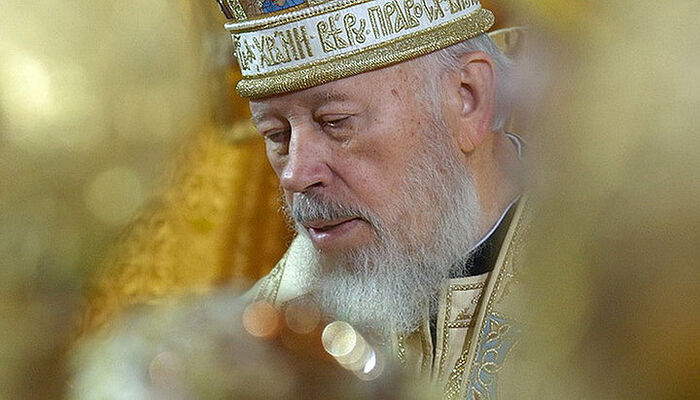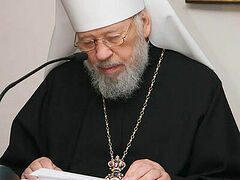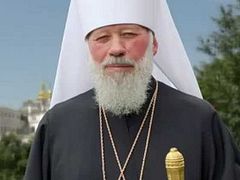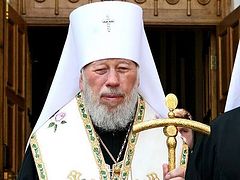Today, in the Ukrainian media sphere, especially after the introduction of Poroshenko's “tomos” into the religious life of Ukraine, and the promulgation of a new schism by the Patriarch of Constantinople Bartholomew, which endangers the unity of not only the Ukrainian Orthodox Church, but the entire world Orthodoxy, one can hear that the so-called “autocephaly of the Ukrainian Orthodox Church,” after the collapse of the USSR, was the longed-for dream of the majority of the country's Orthodox believers, headed by their Primate, His Beatitude, Metropolitan Vladimir (Sabodan; reposed 07/05/2014), who allegedly for the twenty-two years of his primateship in Ukraine, advocated for the “complete and final separation” (of the UOC) from the Russian Orthodox Church, and the acquisition of autocephaly for the UOC with the status of a Local Church. But is that really the case? This issue was discussed in the conference hall of Kiev Theological Academy at a round table dedicated to the memory of His Beatitude Metropolitan Vladimir, on the day of his 85th birthday—November 23 of this year.
Representatives of the older generation of the Kievan clergy, who knew Metropolitan Vladimir when he was the Rector of Moscow's theological schools, as well as hierarchs of the UOC, and representatives of state, cultural and educational organizations, and the Orthodox community were invited to the commemorative event. The words of each participant in the meeting were filled with great love for the reposed hierarch, as they expressed memories of his hierarchical wisdom, simplicity, accessibility, and sympathy for each person, be they a student, peasant or academic, and concerning the theological, literary and poetic heritage of Metropolitan Vladimir.
The Ukrainian media, including various Ukrainian TV channels were also invited to highlight the day of memory of the great hierarch. To them, in particular, was addressed the speech of the Chancellor of the UOC, Metropolitan Anthony (Pakanich) of Boryspil and Brovary, in which he spoke about his many years of correspondence with the late Primate, about his greatest podvig1—that of hierarchical service at the helm of Ukrainian Orthodoxy, during those most difficult conditions of the bleeding schism, and complicated church-state relations for twenty-two years.
Metropolitan Anthony dwelt, in particular detail, on the question of the autocephaly of the UOC and on all kinds of related insinuations related to this subject. These rumors present information in such a way, as to make it seem that the ever-memorable Metropolitan Vladimir stood for a complete separation from the fullness of the Russian Orthodox Church. According to this version of events, the current policy of Patriarch Bartholomew of Constantinople [and] the formation in Ukraine of the so-called “Orthodox Church of Ukraine” is “the realization of the long-term aspirations” of Metropolitan Vladimir while he was Primate of the Ukrainian Orthodox Church.
The younger generation of Ukrainian journalists, brought up on the ideas of the Maidan protests and anti-Russian rhetoric, hardly know that Metropolitan Vladimir (Sabodan), who arrived in June 1992, found himself under conditions of a complete information blockade after his election at the historic Kharkov Council of the UOC. Fewer still know that the Verkhovna Rada of Ukraine2 had already assumed the functions of the ecclesiastical Chief Procurator3, declaring the Kharkov Bishops' Council of the UOC to be “illegal,” and the administration of the then-President of Ukraine, Leonid Kravchuk, for a long time refused to meet Metropolitan Vladimir in person as head of state, ignoring the First Hierarch's statements about the atrocities of schismatics, committed with the full support of local authorities. However, in the thirty years since Patriarch Alexey II of Moscow presented the Gramota in October 1990, no one has annulled or revised [the Ukrainian] ecclesiastical documents of modern history, nor the position of the entirety of the UOC and its primate regarding the status of independence and self-government of the Church in Ukraine, the declaration of its rights and freedoms. Therefore, all attempts to falsify the position of Metropolitan Vladimir of blessed memory regarding autocephaly have no grounds.
“His Beatitude, Metropolitan Vladimir in every possible way protected the Church from interference in her internal life by political forces,” emphasized Vladyka Anthony. Although he understood that the Church, as an institutional and social organism, cannot live [in another world] outside politics. His Beatitude spoke about this shortly before his death:
“I would like to emphasize once again, that it is shortsighted and dangerous to use the Church for political purposes.”
In general, His Beatitude expressed himself very concisely and succinctly toward the end of his life. He had the following to say about autocephaly:
“The Church cannot be changed as secular institutions are changed in our times. The Lord established His Church, and He preserves it. At this time, introducing the status of autocephaly and autonomy is an act which I consider to be dangerous and unnecessary. The Ukrainian Orthodox Church possesses all the rights of broad autonomy and independence in government. The question of autocephaly does not stand squarely today, although conversations are going on both inside and outside the Church. They think that this will give some advantages or neutralize the existing disadvantages. The Local Council of our Church noted that it is satisfied with the current status of the UOC. This is the official position of our Church. This is my position.”
In October of 2008, one might even say that His Beatitude, Metropolitan Vladimir prophesied. In his address to Patriarch Bartholomew of Constantinople, he said the following:
“Recently, the Ukrainian mass media have been discussing the scenario of the Ukrainian ecclesiastical question and the creation of several parallel Orthodox jurisdictions in Ukraine. I declare in response that this way of solving the problem is unacceptable, since it contradicts the canonical principle of “one bishop in/of one city”, this will strengthen the attitudes of ethnophyletism in church society, and aggravate negative tendencies leading to the polarization of Ukrainian society, may lead to violent confrontation in the struggle for churches and church property, and will weaken the missionary potential of Orthodoxy in Ukraine against the background of the activity of new religious movements and Uniatism. And, finally, it will not solve the problem of healing the schism, since non-canonical church groups that claim autocephalous status will remain in Ukraine.”
“Surprisingly, today the words of the reposed hierarch are being turned inside out, trying to make up some kind of justification for the new schism and the activities of the so-called OCU. At the same time, they forget about our spiritual roots, watered not only with tears, but also with the blood of confessors of faith on the Ukrainian land,” said Metropolitan Anthony.
On this memorable autumn day, a funeral Liturgy was also served, which was led by His Beatitude Metropolitan Onuphry of Kiev and All Ukraine in the Academy Church of the Nativity of the Mother of God beside the Far Caves of the Kiev Caves Lavra, after which a memorial service was served at the grave of Metropolitan Vladimir, located opposite the entrance of the church.
The reposed hierarch, who had lived out all the years of his primacy on the territory of the Far Caves, made daily walks along the walls of the ancient Lavra, loved to go to the monastic cemetery, located here, next to the metropolitan and episcopal residence, where he would stay for a while, looking at the place of his future burial and praying.
Today, Metropolitan Vladimir can rightfully be called an outstanding hierarch of the Orthodox Church, a worthy son of the Ukrainian lands. The world fame of this man has touched all continents, and even a star is named after him. He went down in history as a gifted church hierarch, theologian, writer and poet. And on the day of his eighty-fifth birthday, in all churches in Ukraine and also abroad, prayers were offered up for the ever-memorable Metropolitan Vladimir. Eternal memory to this zealous servant of Christ and the beloved son of the Ukrainian nation.




